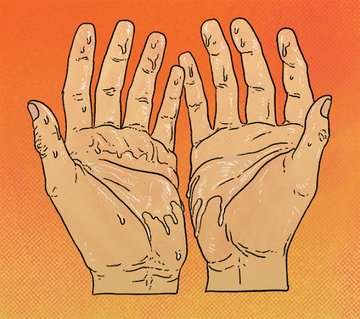“I’ve been suffering from excessive sweating since elementary school.” It’s a sentiment that many hyperhidrosis sufferers have shared since the condition usually begins in childhood. Sadly, the average hyperhidrosis patient goes many years, decades even, before receiving treatment due to embarrassment or not being taken seriously.
And that brings us to an obvious yet overlooked reality - the earlier you start treatment, the higher your quality of life will be later on. This post will focus on individuals who have young family members with hyperhidrosis and adults who have the condition but who have yet to seek treatment.
Hyperhidrosis Typically Begins Early, Treatment Usually Starts Late
After reading through multiple subreddits, Facebook posts, and stories posted in online magazines, we found that most hyperhidrosis sufferers have had the condition since they were kids. Some started noticing their condition as early as their primary school days, whereas others noticed it in high school after hitting puberty. Tragically, kids and teens who sweat too much are ridiculed by their peers. They’re often made aware that their problem is abnormal, which has negative effects down the line.
But it often takes years for sufferers to put their foot down and say “enough is enough”. Treatment for hyperhidrosis usually begins when a person has reached young adulthood or middle age, after enduring many years of isolation, low-self esteem, and embarrassment. But why?
Why the Delay?
- Hyperhidrosis isn’t taken seriously - Hyperhidrosis sufferers deal with the unfortunate irony of being ridiculed or questioned about their problem, but parents and even doctors may downplay its severity. In fact, many sufferers are told “you’ll outgrow it” - which, of course, is untrue and unhelpful.
- Sufferers focus on hiding their condition, not treating it - For younger sufferers, there’s a tendency to hide from others and avoid social situations where excess sweating would lead to embarrassment. Although the inclination to do so is natural, it often leads to a pattern of avoidance rather than addressing the condition.
Many sufferers deal with a combination of these factors, which only prolongs the duration of time it takes for them to seek treatment.
The Long-Term Effects of Delayed Treatment
Untreated hyperhidrosis, especially when a sufferer has felt like the “odd one out” for years, can have some traumatic consequences. They’re not to be taken lightly.
Low Self-Esteem
Kids and teens who suffer from hyperhidrosis may be mocked, ridiculed or identified as having a problem. This is traumatic for youngsters because during these formative years, they want nothing more than to blend in, not stand out (especially for being too sweaty). As they grow older, living with the thought that others may be put off by sweaty handshakes or other areas may cause them to feel less attractive. This, of course, contributes to lower self-esteem.
Poor Interpersonal Relationships
With low self-esteem, there’s a high likelihood that both kids and adults who suffer from hyperhidrosis will want to isolate themselves. After all, if there’s a sense that others judge them for sweating too much, there’s a natural inclination to avoid being judged in the first place. The easiest way to do so is to avoid social situations where judgment may occur behind their backs.
Professional Repercussions
For adults with hyperhidrosis, low self-esteem and a lack of confidence can seep into their professional lives. Adults often feel that a sweaty handshake or sweat-soaked clothing will reflect poorly on them at interviews, presentations, or meetings. As a defense against what may feel like criticism, they may hide from opportunities where they have a chance to prove themselves as valuable employees.
Early Treatment Prevents Long-Term Damage to Mental/Emotional Health
The worse repercussions of hyperhidrosis are the mental and emotional effects. True, it’s a nuisance having to deal with wet steering wheels and soaked clothes. However, what really takes a toll on sufferers is the effort they put into concealing their sweating and keeping it under control.
It’s exhausting.
Sufferers often feel humiliated, overwhelmed and there can even be significant anxiety and/or depression. Fortunately, they can avoid the worst of these effects if they treat their sweating as soon as possible with the right protocol.








